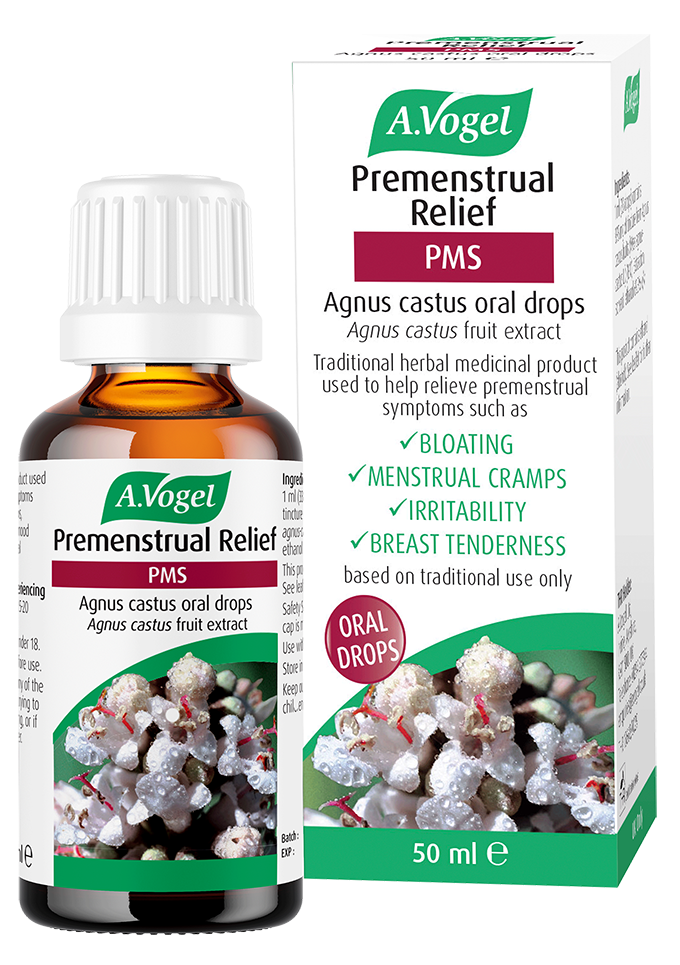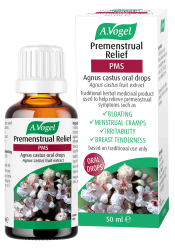An introduction to skin problems and PMS
PMS (premenstrual syndrome) can affect the way your skin looks and feels. For any woman, this is a serious matter.
Skin problems can arise as a direct result of hormonal changes such as with acne and localised rashes or itching of the skin (known as neurodermatitis). However, more commonly, underlying skin conditions such as eczema, psoriasis or cold sores can worsen just before menstruation each month.
Aside from the irritation and pain which skin problems cause, women may begin to feel self-conscious about their problem. If you are already feeling a bit stressed or low in mood, this can multiply problems by knocking self-confidence.
Why does PMS cause skin problems?
There are many reasons for this – but the basic one is that between ovulation and menstruation, a woman goes through a period of two weeks where levels of the female hormones (oestrogen and progesterone) fluctuate.
This in turn affects many other hormones in the body:
- Levels of cortisol, important in controlling inflammation, change. This could explain why some women find that their eczema or psoriasis can worsen with each menstrual cycle
- Cortisol also has an influence on the body’s immune system. This could be the reason why there a greater tendency for an outbreak of cold sores in the days before a period
- Just before menstrual bleeding starts, levels of testosterone prevail over oestrogen. This gives rise to an increase in the size of skin pores and more secretion of oil (sebum). For some women, this leads to a ‘dull complexion’, but more crucially, production of all this oil blocks pores, causing normal skin bacteria to penetrate further into the skin, increasing the chances of acne.
- If oestrogen is low generally, then again, then again the effects of testosterone can take over. Low oestrogen is often characterised by light, infrequent periods.
Not sure if low oestrogen is the problem? Click to watch our video on 'Understanding your period and hormone imbalance!'
What can I do to help myself with my skin problems?
There are several things you can do at home to try to keep your skin as healthy as possible:
- If your skin problems are caused by excess oil production, then wiping up this oil regularly or looking for clay face masks will help to reduce the amount of oil in your skin
- If you have developed skin problems, try not to touch the affected areas too much, even if they are sore or itchy. This will only cause the irritation and inflammation to increase, as well as running the risk of leaving scars
- Drinking plenty of water will keep your skin hydrated. It also helps to flush any toxins which are irritating your skin out of your body. Aside from this, it helps to improve the function of your liver and digestive system, and often the overall health of your body is reflected in your skin
- Exercise is also important as it causes your skin to sweat and clean out the pores. If you have a shower directly after exercise then you can wash away all the dirt and sweat you have just cleaned out.
Are there herbal remedies to help me?
If your skin problems worsen in a distinct pattern consistent with your menstrual cycle, the first step you should take is to address the root of the problem, which is PMS. Most herbalists will consider Agnus castus to be the main herb of choice and basis of treatment.
Read why 100% of women recommend Agnus castus to relieve symptoms of PMS
Also known as Chaste Tree or Chasteberry, extracts of Agnus castus berries have been used for many years to treat a variety of premenstrual symptoms. There is now a good body of evidence for its use in treating emotional symptoms (irritability, mood swings) as well as physical symptoms such as period pains, breast pain and skin problems.
If skin problems are more consistent and in combination with ligher, less frequent periods then low oestrogen may be at play and some soy isoflavones may be more beneficial.
If additional help is needed, a variety of herbal creams may be recommended. These include:
What about conventional medicines?
If you are suffering from a specific skin condition such as eczema or psoriasis, your doctor will have specific treatments for these problems. Some of these many involve the use of steroid creams or tablets.
Acne, if severe, may be treated using oral antibiotics. However, as there is now an increasing problem with antibiotic resistance, these are used only when absolutely necessary.
If you are affected by other symptoms of PMS, your doctor may consider the use of hormonal treatment such as the oral contraceptive pill.
My PMS Journal
Keep track of your symptoms with our PMS Diary to identify patterns & help discover ways to minimise them.









